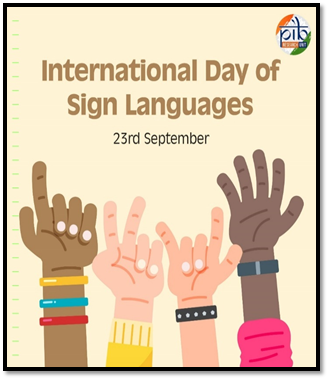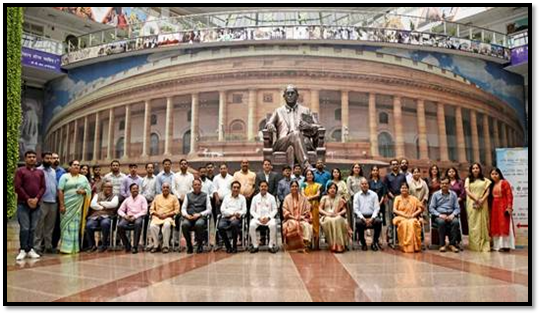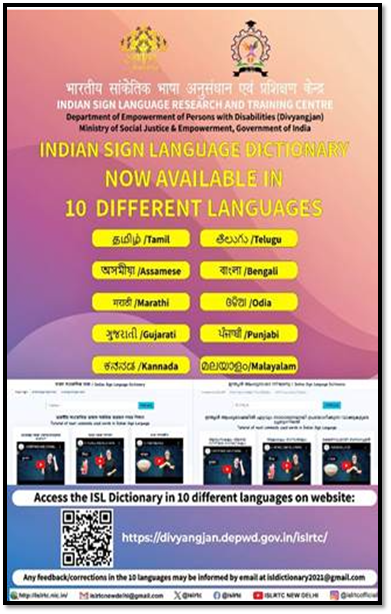Sign Language Day: Advancing Rights for the Deaf Community
Indian Sign Language is fundamentally different from Hindi, English, and other spoken languages in India; it possesses its own unique structure and is not merely a hand representation of any spoken language
Introduction

International Day of Sign Languages, celebrated on September 23rd each year, is a significant occasion that underscores the vital role of sign languages in promoting the rights and recognition of deaf individuals worldwide. Established through the 2017 UN General Assembly Resolution A/RES/72/16, this day highlights the importance of early access to sign language and quality education, which are essential for the growth and development of deaf individuals. The resolution not only advocates for linguistic and cultural diversity but also acknowledges the more than 70 million deaf people globally, with over 80% residing in developing countries and using over 300 different sign languages. In India, this day is observed as Sign Language Day, celebrating Indian Sign Language (ISL) as a natural visual-manual language that fosters communication within both the Deaf and hearing communities. ISL is not at all similar to Hindi, to English, or to any other spoken language in India. It has its own structure and is not a hand representation of any spoken language. Since its inaugural celebration in 2018 as part of the International Week of the Deaf,[1] Sign Language Day has served as a platform to raise awareness about the significance of sign languages in achieving international development goals and ensuring the full realization of human rights for deaf individuals. The date is particularly meaningful as it coincides with the establishment of the World Federation of the Deaf (WFD) in 1951, further reinforcing the global commitment to recognizing and preserving the rich tapestry of sign languages.
Sign Language Day – 2024

On September 23, 2024, the Sign Language Day was celebrated with Union Minister for Social Justice & Empowerment, Dr. Virendra Kumar, as the Chief Guest, and Minister of State (SJE) B.L. Verma serving as the Guest of Honour. Organized by the Indian Sign Language Research and Training Centre (ISLRTC) under the Department of Empowerment of Persons with Disabilities, this year’s theme is “Sign up for Sign Language Rights.”
Key Initiatives and Launches
- 2500 New Terms in Indian Sign Language (ISL): In collaboration with four organizations, ISLRTC introduced 2500 new ISL terms covering subjects like mathematics, science, and various academic fields. This expansion aims to enhance the existing ISL dictionary and support education.
- 100 Concept Videos in ISL: Designed for hearing-impaired children in the 6th grade, these videos provided detailed explanations of subjects like math and science, using graphics and subtitles to promote inclusive learning.
- ISL Dictionary in 10 Regional Languages: To improve accessibility, the ISL dictionary is now available in ten regional languages, making it easier for diverse communities to engage with ISL.
- Educational Animated Videos in ISL: These videos focused on moral values and provide a new learning experience for hearing-impaired children, fostering an inclusive educational environment.
- Deaf Role Model Videos in ISL: This initiative aims to inspire and motivate hearing-impaired children by showcasing successful deaf individuals who serve as role models.
- 7th Indian Sign Language Competition: The event also featured the winners of the 7th Indian Sign Language Competition, a national-level contest showcasing the creativity and skills of students with hearing disabilities.

Schemes for Helping Persons with Disabilities
The Department of Empowerment of Persons with Disabilities (DEPwD) in India implements several schemes and provisions aimed at enhancing the quality of life for individuals with disabilities, including deaf and dumb students. Here’s a breakdown of the major initiatives:
1. Assistance to Disabled Persons for Purchase/Fitting of Aids/Appliances (ADIP)
This scheme provides funds to various Implementing Agencies for distributing aids and assistive devices to eligible individuals with disabilities across the country. Notably, it includes provisions for Cochlear Implant Surgery[2] for children with hearing impairments.
2. Financial Assistance for Deaf Colleges
DEPwD offers financial support to colleges specifically for deaf students. This assistance is available for colleges affiliated with UGC in five regions[3] of India, ensuring that deaf and dumb students have access to quality education.
3. Scholarships for Students with Disabilities (Divyangjan)
An umbrella scheme including for deaf and dumb boys and girls provides scholarships across six components[4] for students with disabilities.
4. National Institutes and Regional Centers
Two key institutes, the Ali Yavar Jung National Institute for Speech & Hearing Disabilities in Mumbai and the Indian Sign Language Research & Training Centre (ISLRTC) in New Delhi, focus on hearing and speech disabilities. Additionally, 25 Composite Regional Centres (CRCs) have been established to provide rehabilitation services, skill development training, and awareness programs.
5. Diploma in Teaching Indian Sign Language
ISLRTC offers a diploma course in teaching Indian Sign Language, with tuition fees waived for students registered with the Unique Disability ID (UDID)[5]. They have also developed a comprehensive sign language dictionary of 10,500 words to support the educational needs of deaf students.
6. Other Steps
The Indian government's commitment to supporting persons with disabilities is underpinned by a robust constitutional framework. A significant milestone in this journey is the Rights of Persons with Disabilities (RPwD) Act of 2016, which emphasizes inclusive education as a fundamental right. Under this Act, educational institutions are empowered to ensure that children with benchmark disabilities including Deaf and Dumb children—those with a disability of 40% or more—have access to free, quality education in an inclusive environment until the age of 18. The Act also promotes equity by mandating a minimum of 5% reservation for persons with disabilities in government and aided higher educational institutions.
Complementing these efforts, the Samagra Shiksha Scheme[6], launched by the Department of School Education & Literacy, plays a vital role by providing dedicated support for Inclusive Education for Children with Special Needs (CwSN). This comprehensive initiative ensures that CwSN receive essential resources, including financial support for aids and educational materials, alongside tailored interventions that foster their participation in schools from pre-school through class XII. Notably, a stipend of Rs. 200 per month is provided to support girl children with disabilities, underscoring the commitment to inclusivity and equity in education. These efforts collectively enhance the educational landscape, empowering all children to thrive and succeed.
Significance of the Day
International Sign Language Day serves as a reminder of the need to preserve sign languages as vital components of cultural and linguistic diversity. It highlights the importance of creating positive awareness about Indian Sign Language (ISL) across all sections of society.




addComments
Post a Comment